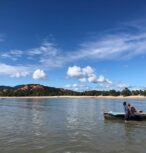DNA reveals the past and future of coral reefs
New DNA techniques are being used to understand how coral reacted to the end of the last ice age in order to better predict how they will cope with current changes to the climate. James Cook Univer

From 2005 to 2022, the main node of the ARC Centre of Excellence for Coral Reef Studies was headquartered at James Cook University in Townsville, Queensland (Australia)








Abstract: There are increasing calls to deliver effective, equitable marine conservation – particularly in places where coastal communities are dependent on their natural resources for a range of benefits from cultural to economic. However, as a large NGO implementing conservation programs around the world, it is not always clear what are the best strategies and tools to implement to ensure sustainable and equitable outcomes in various contexts. We need evidence based-solutions on what works – and what doesn’t. And while there is an increasing evidence base, much of the existing evidence is scattered, outdated, or inaccessible behind paywalls and jargon -and are not practical or relevant for immediate conservation needs. Transdisciplinary science can help bridge the science – conservation gap, shaping research that directly informs conservation programs while also pushing boundaries to shape the future of conservation science and practice. However, despite good intentions, transdisciplinary science can be difficult to implement due to (1) misalignment of incentives (e.g. focus on impact factor metrics, donor driven agendas, or philanthropy ‘fads); (2) tradeoffs between speed and “rigor” (information needed now – comprehensive and systematic research approaches often lags behind decisions); (3) structural and cultural barriers ( e.g. disciplinary and institutional silos, jargon, lack of trust, gender/race issues); (4) Generality vs. context-specificity (e.g. differences in research needs to inform global strategies vs local projects). Here, we give an example of an ongoing transdisciplinary research partnership between NGOs and acadamia and how we have begun to navigate some of these issues. While much work has been done elsewhere on knowledge co-production and the science-policy-practice interface, here we will provide examples of how we work together to co-develop a research agenda –primarily focusing on coastal communities and area-based conservation to deliver more impactful, insightful science.
Biography: https://nicholas.duke.edu/people/faculty/gill
https://www.worldwildlife.org/experts/gabby-ahmadia
New DNA techniques are being used to understand how coral reacted to the end of the last ice age in order to better predict how they will cope with current changes to the climate. James Cook Univer
A new study on the effects of climate change in five tropical countries has found fisheries are in more trouble than agriculture, and poor people are in the most danger. Distinguished Profess
James Cook University researchers have found brightly coloured fish are becoming increasingly rare as coral declines, with the phenomenon likely to get worse in the future. Christopher Hemingson, a
Researchers working with stakeholders in the Great Barrier Reef region have come up with ideas on how groups responsible for looking after the reef can operate more effectively when the next bleaching
Abstract: As marine species adapt to climate change, their heat tolerance will likely be under strong selection. Individual variation in heat tolerance and its heritability underpin the potential fo
Abstract: The Reef Ecology Lab in KAUST’s Red Sea Research Center explores many aspects of movement ecology of marine organisms, ranging from adult migrations to intergenerational larval dispersal
Abstract: Macroalgal meadows are a prominent, yet often maligned component of the tropical seascape. Our work at Ningaloo reef in WA demonstrate that canopy forming macroalgae provide habitat for ad
Abstract: Sharks are generally perceived as strong and fearsome animals. With fossils dating back at least 420 million years, sharks are not only majestic top predators but they also outlived dinosa
Abstract: Connectivity plays a vital role in many ecosystems through its effects on fundamental ecological and evolutionary processes. Its consequences for populations and metapopulations have been
Abstract: Evolution of many eukaryotic organisms is affected by interactions with microbes. Microbial symbioses can ultimately reflect host’s diet, habitat range, and even body shape. However, how
Abstract: The past few years have seen unprecedented coral bleaching and mortality on the Great Barrier Reef (GBR) but the consequences of this on biodiversity are not yet known. This talk will expl